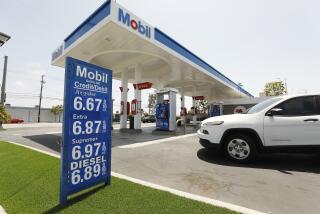Enough Fuel to Put Y2K Fears in Neutral
- Share via
Got gas?
If not, don’t worry. The gasoline distribution system has stockpiled more than enough fuel to accommodate even panic buying in the last few days of the year, experts say.
And the oil industry has spent $2 billion to ensure that gasoline pumps will continue to pump, credit card readers will continue to read credit cards and oil refineries will continue to transform oil into gasoline as ’99 becomes ’00 at midnight Friday.
“If everyone decides to top off at the same time, there’s more than enough gasoline for them,” said Red Cavaney, chief executive of the American Petroleum Institute, the oil industry’s primary trade association. “We’re trying to assure people that it’s all going to be there.”
Cavaney noted that gasoline stations usually store enough fuel for 7 1/2 days, with an additional 23-day supply available nearby at terminals, pipelines and refineries. Many API members are keeping extra supplies on hand to cover demand anticipated to equal that of a heavy holiday driving weekend, he said.
But thus far, there are few, if any, signs of hoarding among California motorists, at least as seen by the Nos. 1 and 2 retailers, Atlantic Richfield Co. and Chevron Corp.
Los Angeles-based Arco has not seen any surge in gasoline demand, but as a precaution, “we’ve moved as much product as close to the customer as possible,” said spokeswoman Cheryl Burnett. “Now it’s just a matter of waiting and seeing.”
“We are preparing for this like we would for Fourth of July or Labor Day,” said Chevron spokeswoman Nancy Malinowski, adding that demand could temporarily increase about 10%. “We’re asking our dealers to keep their tanks 100% full during the last week of the year.”
At a news conference Thursday, U.S. Energy Secretary Bill Richardson warned motorists not to create artificial localized supply problems and possible price spikes by buying those last few gallons for their nearly full gas tanks.
“If you have half a tank 1/8of gasoline 3/8, you’re good to go. There’s no need to hoard gasoline,” Richardson said.
But even if every car owner decides to fill up on Dec. 31, there will be enough service stations with enough gasoline to keep them rolling, says economist Thomas Hogarty, who studied year-end fuel supplies for Oil & Gas Journal, a trade publication.
Here are Hogarty’s year-end gas-and-go calculations:
The nation’s 180,000 service stations usually have about 2.7 billion gallons of gasoline in their underground storage tanks, which is adequate to handle a one-time demand surge by the 200 million vehicles traveling U.S. roads, Hogarty said.
Figuring the 180,000 gas stations typically can simultaneously handle eight customers each requiring an average of 10 minutes each to gas up, then--assuming 24-hour operation and smooth traffic management--each outlet can service 1,152 customers in a day, or more than 207 million vehicles overall.
In such a scenario, the big problem would be the inability of the roads to handle so many people, said Hogarty, an adjunct economics professor at Virginia Polytechnic Institute and oil industry consultant.
The Y2K fear driving potential panic buying is that computers will read the “00” in “2000” as “1900” and will not operate properly in such devices as gasoline pumps and credit card readers as well as pipeline and refinery machinery, and at the plants that generate the electricity to run the machines.
But a survey by API in October found that companies covering 96% of oil and natural gas demand in the United States have certified that they are ready for the rollover. Nearly 150,000 retail gasoline outlets also said they are ready for the date change. The electricity industry has also said it is prepared for the change and anticipates no problems.
“We have, for almost five years now, been building toward this day,” Cavaney said.
Consumer Reports advises drivers to keep their tanks at least half full as the end of the year approaches, but officials at the American Automobile Assn., which has issued no such recommendation, say their biggest worry is people storing gasoline at home or in the trunks of their cars.
“We think that’s probably a bigger thing to fear than Y2K because of the potential for fire,” said AAA spokesman Geoff Sundstrom.
* FUTURE WATCH: With the end of 1999 near, look at how concerns about the Y2K transition are affecting commerce. C2
More to Read
Inside the business of entertainment
The Wide Shot brings you news, analysis and insights on everything from streaming wars to production — and what it all means for the future.
You may occasionally receive promotional content from the Los Angeles Times.










